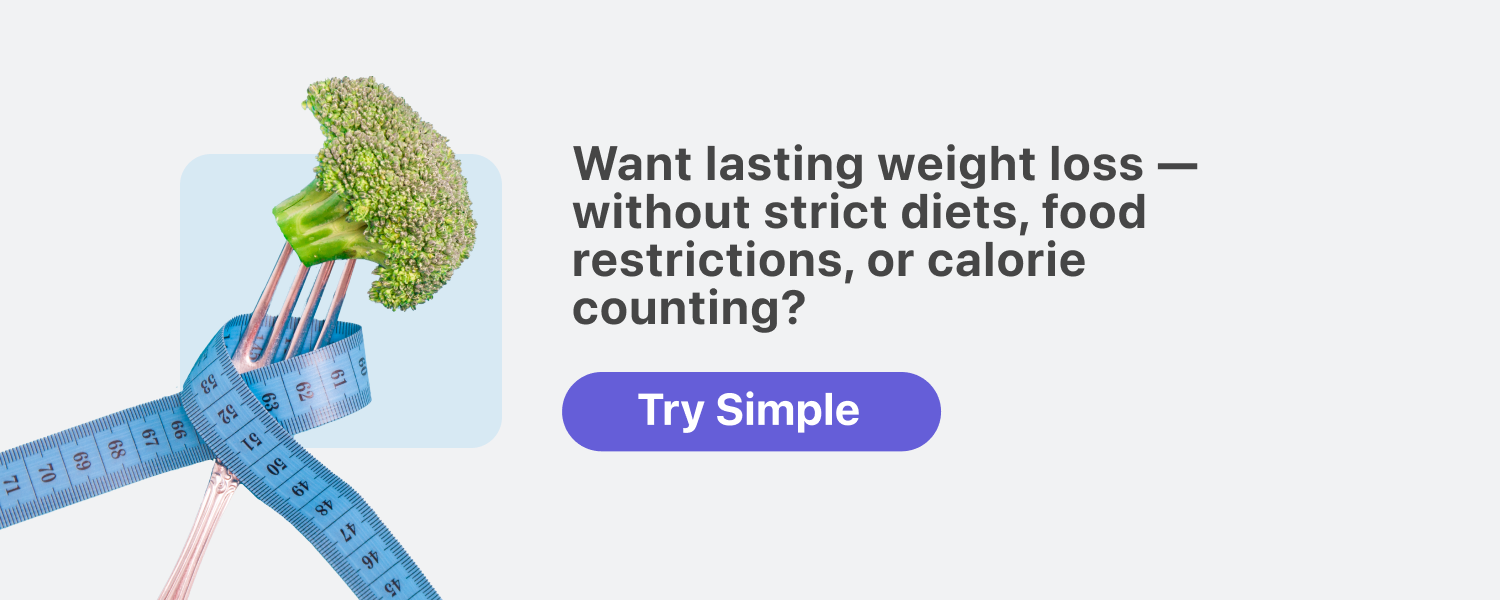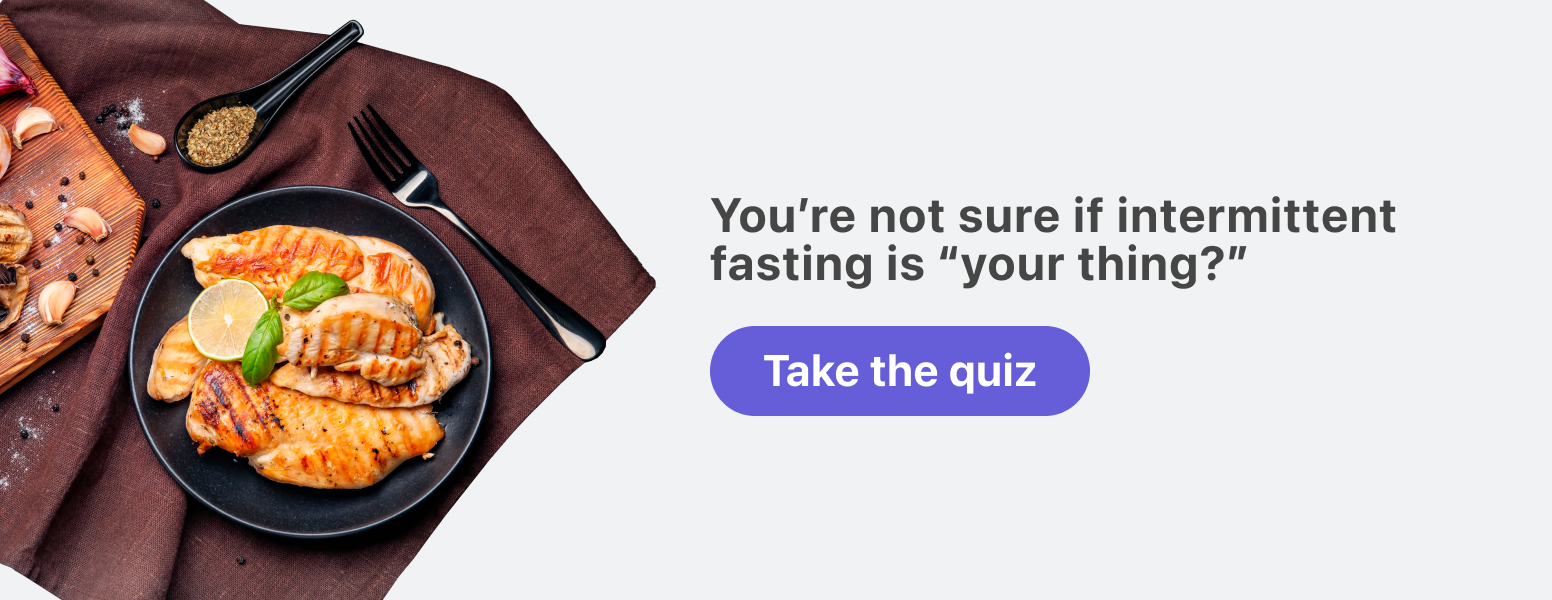Should you have “cheat days”? Simple’s guide to flexible intermittent fasting

If you’ve been in the “diet world” long enough, you might have heard about the concept of a “cheat day.”
This is typically considered a “day off” from your diet. On the so-called “cheat day,” you can eat whatever and whenever you want, then you’ll return to your regular menu the following day.

But here’s the thing: intermittent fasting is a lifestyle.
To lose weight — and keep it off — means building healthy and sustainable habits.
So there’s no “on.” There’s no “off.”
There’s no “bad” or “good” either … or “guilty” versus “guilt-free.”
There are only grown-up choices about how you want to live today based on your goals and needs.
And that’s the beauty of intermittent fasting. Sometimes you eat. Sometimes you don’t. And sometimes, you pause for a few hours before mindfully returning to eating.
There are no “rules” other than some simple guidelines that YOU are in charge of customizing.
By the way, if you’re new to this whole idea of intermittent fasting and looking to get started, check out our guide to intermittent fasting for beginners. (And if you’re looking for a little more help deciding what your best approach is, we gotcha! Try our Simple quiz, and we’ll help you get started on your intermittent fasting journey today.)
So how can you fast flexibly — and make it work for you?
Here’s our guide to hanging loose with fasting while still reaching your goals.

Why a flexible approach works best for long-term goals
If you have to do something that you don’t want to do within, say, the next hour … you can probably do it. Most of us can grit our teeth and get through something crummy for a little while: a long red-eye flight full of crying babies, a dreary work meeting, filing our tax paperwork, and so on.
But now imagine that the baby-stuffed airplane, soul-depleting meeting, or finger-slicing paperwork is the rest of your life. Auuughhh!!
Yet that’s how most people approach “diets.” They see it as a horrible chore that they’ll “get through” until they’re “done” or “off the diet.” But then what?
If you want a long-term goal — like losing weight and keeping it off, getting healthier and fitter, working toward a better life, and so on — you need to find a sustainable process.
Flexibility helps you learn and practice intermittent fasting

It can be challenging to start and stick to a new routine. Especially when it involves big changes, like your regular daily routines or how you show up to social events.
Beginning with smaller changes — for instance, trying out intermittent fasting a few times a week at first or starting with shorter fasts — can make it much easier for that new routine to stick.
Flexible fasting helps you experiment, explore, and discover what works for you without asking you to change everything at once.
Flexibility helps you stay the course
Ironically, a flexible intermittent fasting mindset and practice may actually make you more likely to succeed.
For instance, a 2016 study in the Journal of Consumer Psychology found when participants included planned deviations along the path to their purpose, they were more likely to reach their goal.[1]
Practicing flexibility can offer you a much-needed reset when it comes to your motivation and self-control.
The catch? Be intentional with your flexibility
That 2016 study found something interesting:
Flexibility requires purpose and planning to be successful.
For instance, if people were working on saving money and deliberately set aside a little bit of cash for an impulse buy, they were more likely to keep saving rather than give up. But if those impulse buys were, well, impulsive all the time … bye-bye savings.
With intermittent fasting, it could look like this:
- Purposely planning which days of the week you’ll fast and which you won’t.
- Purposely planning longer fasts on some days and shorter fasts on other days.
- Purposely planning a week off from fasting altogether while practicing mindful eating and the appreciation for food that fasting teaches … then returning to fasting with “fresh eyes.”
- Purposely planning a meal (or a day) where you enjoy all the foods you normally wouldn’t … such as those deliciously greasy BBQ ribs that always give you indigestion (but are so worth it), that ridiculously expensive gourmet dessert, or your family’s epic holiday spread that only happens once a year (for which your arteries are grateful).
See the keywords there?
Purposeful planning.
Research shows that pre-commitment (in other words, deciding beforehand what we will do) helps us stay the course with healthy behaviors.[2,3,4]
Tracking your meals in the Simple app is a great way to plan your meals around social events and other life events. It also helps you build awareness about your choices. If this sounds right up your alley, start by taking our Simple quiz, and we’ll get you on your way (and be there to cheer you every step of the way).
Heads up, tracking may not be for you if you have a history of eating disorders or disordered eating behaviors, so make sure to speak with your healthcare provider first.
Fasting with flexibility built in
Some types of intermittent fasting lend themselves naturally to flexibility, such as:
- the 5:2 approach, where for 5 days of the week, you eat normally, then either fast or eat a very low daily calorie intake (around 500–600 calories) on the other 2 days;
- alternate day fasting, where you alternate fasting (or very low-calorie) days with days of normal eating; or
- 12:12 fasting, which alternates 12 hours of fasting and 12 hours of eating, which is pretty manageable for most people (because remember, you’re sleeping through most of that).
You can also create a custom fasting schedule in your Simple app — for instance, weekdays versus weekends.
How to be intentionally flexible

Decide what “flexible” means to you.
Choose how you want to be flexible.
Is it about time — such as how long you fast?
Food choices — such as what you eat during your eating window?
Schedule — such as when you fast or eat?
All of the above? It’s your decision!
Decide what your goals are.
If you’re here, you probably want to do some combination of losing weight, getting healthier, and/or adopting better lifestyle habits.
What combination of planning and flexibility can help you get there?
Decide on your “guardrails.”
What’s your personal baseline — what you won’t go below?
For instance, using the example of exercise, your baseline might be, “I’ll walk the dog around the block every day … after all, she has to go, and I like my rugs.”
A baseline has to be reasonable and realistic. It’s the absolute bare minimum you’re willing to do, no matter what. Even if it’s pouring rain, you’ll still take your dog out.
What’s your aspirational future? What are you working toward?
Well, when it comes to exercise, maybe it’s an amazingly scenic and challenging hike.
Great. So now you know you’ll spend most of your time and energy somewhere in between the “dog walk level” and the “epic hike level” of effort.
Similarly, with fasting, what’s your baseline?
- One fast a week?
- One extra hour of pausing between hunger cues and an intentional meal?
And what’s your aspirational future?
- Integrating fasting into your lifestyle?
- One longer fast a week, like a 20:4 schedule?
Cool … you’ll spend most of your time in between those two boundaries. That’s a lot of room to play!
Decide on your purposeful plan.
When and how will you choose to be flexible?
Think ahead as much as you can. Be intentional where possible.
Is your fourth cousin’s wedding coming up? Are you planning a long trip? Is someone in your kitchen right now making you a special 4-course anniversary meal? (Pro marriage tip: eat the meal.)
Anticipate proactively and decide deliberately.
Using the timer in your Simple app can help you pre-commit to a purposeful plan.
Decide how you’ll calibrate your flexibility.
Are there times you need or want to be more or less flexible?
In other words, how will you know if your choices are moving you closer toward or further from your goal?
How will you stay accountable to yourself?
Decide how you’ll return to your chosen path if you’ve strayed too far away.
What happens if you really feel “off-track,” even with flexibility?
For instance, what if you have days where you blast right through those guardrails you set up for yourself?
How will you gently guide yourself back to being on the road toward your goals?
Frequently asked questions about “cheat days” and intermittent fasting
Flexible fasting focuses on being realistic and adaptable within the normal ebb and flow of life instead of holding yourself to a stringent standard that’s hard to meet.
It prevents you from labeling certain foods or behaviors as “bad” or “good,” which can lead to feeling shame and guilt about your choices.
This realistic approach helps you think and behave much more positively and productively.
Absolutely. A flexible approach encourages balanced eating and mindfulness. It can lead to sustainable weight loss and improved health markers because it’s easier to maintain over time, and you aren’t wasting energy punishing yourself for “being bad.”
Flexible fasting avoids rigidly sticking to fixed fasting hours, which can reduce stress and make fasting more manageable. It enables you to tailor your fasting schedule to your day-to-day life — which ultimately makes it easier and more sustainable to do.
Flexibility doesn’t mean abandoning fasting goals — it means adapting them to your life. You can still experience the positive effects of fasting without feeling constrained.
Transitioning from rigid fasting schedules to a flexible approach involves gradually adjusting your mindset and routine.
Understand that flexibility doesn’t mean losing control; it means gaining a healthier relationship with both fasting and eating.
Make small changes. Ease into a flexible approach by gradually extending or adjusting your fasting windows.
Understand that transitioning to a flexible approach might take time. There’s no need to be perfect; instead, celebrate the progress you make along the way.

- Coelho do Vale R, Pieters R, Zeelenberg M. The benefits of behaving badly on occasion: Successful regulation by planned hedonic deviations. J Consum Psychol. 2016 Jan 1;26(1):17–28.
- Kelly CW. Commitment to health: a predictor of dietary change. J Clin Nurs. 2011 Oct;20(19-20):2830–6.
- Schwartz J, Mochon D, Wyper L, Maroba J, Patel D, Ariely D. Healthier by precommitment. Psychol Sci. 2014 Feb;25(2):538–46.
- Kelly CW. Commitment to health theory. Res Theory Nurs Pract. 2008;22(2):148–60.
